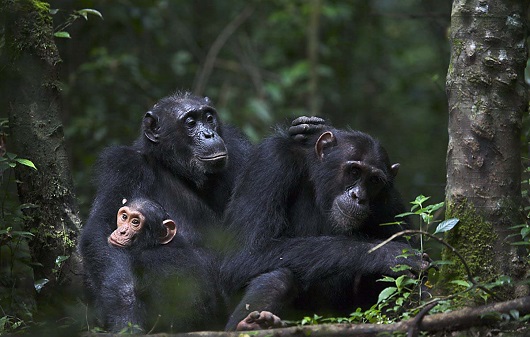With a little help from my friends

Scientists have discovered that support from family and friends significantly reduces stress in wild chimpanzees during conflicts with rival groups.
In humans and other social animals stress is associated with poor health and high mortality. These negative effects can be buffered by receiving social support from relatives or friends. However, the mechanisms responsible for this effect remain largely unknown.
Research conducted by scientists at the University of St Andrews and the Max Planck Institute for Evolutionary Anthropology in Leipzig studied how wild chimpanzees cope with stressful and non-stressful situations when a close bond partner is present or absent.
They measured the animals’ urinary stress hormone levels during episodes of intergroup conflict and during periods of grooming and resting and found that the support of a friend significantly reduced the chimpanzees’ stress hormone levels, especially in situations of conflict.
But even during affiliative activities with the bond partner stress levels were generally lower. The scientists concluded that daily supportive actions by friends and family may be key to regulating stress hormone activity, and thus the negative effects of stress, a finding with potential medical implications for humans.
 The study which led to these findings was carried out by Professor Klaus Zuberbuhler of the School of Psychology and Neuroscience at St Andrews as part of his chimpanzee study project in the Budongo Forest, Uganda.
The study which led to these findings was carried out by Professor Klaus Zuberbuhler of the School of Psychology and Neuroscience at St Andrews as part of his chimpanzee study project in the Budongo Forest, Uganda.
Urine samples from the animals were combined with data on their ongoing social behaviour. The researchers observed the behaviour of wild chimpanzees during different types of events: stressful and potentially life-threatening intergroup encounters, everyday grooming interactions and periods of resting.
The researchers also checked whether chimpanzees’ close bond partners had been present or absent during these events. Once one of the events had taken place the researchers collected every possible urine sample for the next six hours and analysed them to determine the chimpanzees’ stress hormone levels. The hormonal analyses were done at the Max Planck Institute.
Professor Zuberbuhler said: “This study is a major methodological breakthrough. By continuously collecting urine samples of free-ranging, naturally interacting wild chimpanzees, it has become possible to study the role of various hormones in governing the daily social decisions of our closest living relatives.
“The major finding here is that long-term social bonds, or ‘friendships’, play an especially important role, demonstrating that the effects of hormones go much beyond the ‘here-and-now’, but interact with the life histories and long-term social strategies of these animals.
“Due to this type of work, the parallels to human behaviour have become even more apparent. These evolutionary ancient hormonal systems are akin to a time machine, providing us with a direct and clear view into our evolutionary past.”
Notes to news editors
‘Social support reduces stress hormone levels in wild chimpanzees across stressful events and everyday affiliations’ is published by Nature Communications.
All photographs related to this Budongo research are by Florian Möllers and are subject to copyright: © F. Möllers/RZSS
Issued by the University of St Andrews Communications Office, contactable on 01334 467310/2530 or [email protected].
Category Research